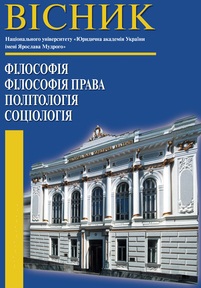ВПЛИВ ПРАВОВОГО ПОЗИТИВІЗМУ НА ФОРМУВАННЯ ФІЛОСОФСЬКО-ПРАВОВИХ ІДЕЙ В ПРИЙНЯТТІ РІШЕНЬ ВЕРХОВНИМ СУДОМ США
INFLUENCE OF OF LEGAL POSITIVISM ON FORMING PHILOSOPHICAL AND LEGAL IDEAS IN DECISION MAKING BY THE SUPREME COURT OF THE USA
Author(s): Hanna KovalenkoSubject(s): Law, Constitution, Jurisprudence, Philosophy of Law
Published by: Національний юридичний університет імені Ярослава Мудрого
Keywords: legal positivism; legal formalism; legal originalism; philosophy of justice; US Supreme Court;
Summary/Abstract: Problem setting. In the period of the establishment of statehood and to correct mistakes that have already occurred, there is an urgent need to understand such a theoretical heritage and practical experience. Illumination of the ideological basis of the activities of the Supreme Court of the USA in making decisions, substantiating decisions or highlighting special opinions on a case is necessary in terms of the formation of a judge's philosophy and its implementation in decisions. One of such philosophical and legal grounds is the direction of legal positivism, which influenced decision-making by judges and became part of the judiciary philosophy. The coverage of this issue will give the modern philosophy the right to be in constant contact with actual events and problems, which will ensure its leading role in the development of the legal system of Ukraine.Recent research and publications analysis. The results of the research of these problems give an opportunity to note that in general, the systematic scientific understanding of the problem of establishing the flow of the philosophical and legal direction of legal positivism to the work of the Supreme Court of the United States, which is reproduced during the adoption of a judicial decision, are only at an early stage.Paper objectiv. The purpose of this article is - through the coverage of the theoretical context of the modern philosophical and legal direction of legal positivism to show its influence on the work of the Supreme Court of the United States.Paper main body. Considered the views and ideas of thinkers and activists representing a positivist trend, whose ideas had the greatest influence on the American and world philosophical and legal opinion and the formation of the philosophical and legal views of judges of the Supreme Court of the United States. The interaction between the direction of legal positivism and the formation of judicial philosophy is shown. The role and significance of legal positivism for the development of the philosophy of justice, which should be in constant contact with actual events and problems, should be ensured, which would ensure its leading role in the development of the legal system of Ukraine, the processes of building the rule of law through the development of state-building processes, which is relevant to modern Ukraine.Conclusions of the research. Due to the coverage of the theoretical context of the contemporary philosophical and legal direction of legal positivism, attempts have been made to highlight its influence on the work of the Supreme Court to further determine the influence of the philosophical and legal aspects of these decisions on the contemporary philosophical and legal opinion of Ukraine. It is the philosophical and legal component in decisions and rationale for the decision taken into account, interested in and influencing the philosophical and legal opinion of the post-Soviet countries. In the variety of modern philosophical and legal thought should be noted a special direction, concerning the essence and ways of functioning of the law itself. Firstly, it is a fundamental difference between natural-legal and positivist understanding of law, the key point of which is the relation to the role of moral factors. Secondly, depending on the recognition or non-recognition of this role, the approach to the interpretation of legal norms is defined - either legal formalism and originality, or their creative interpretation, which takes into account both changes in the external situation and changes in the mental standards of the lawyers themselves, in the first place judges and lawyers.
Journal: Вісник НЮУ імені Ярослава Мудрого. Серія: Філософія, філософія права, політологія, соціологія
- Issue Year: 42/2019
- Issue No: 3
- Page Range: 126-141
- Page Count: 15
- Language: Ukrainian

